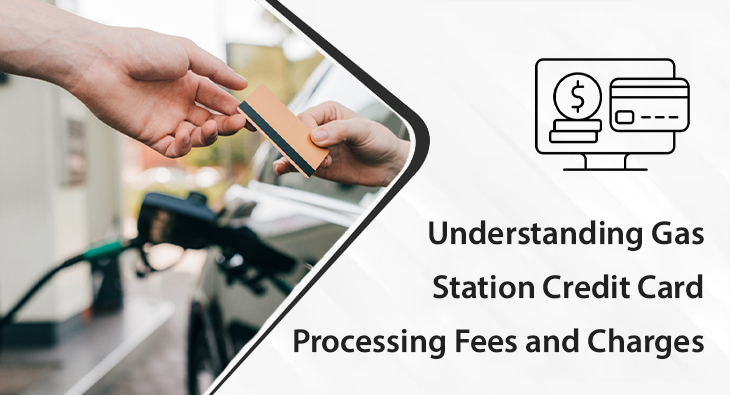Understanding Gas Station Credit Card Processing Fees and Chargess
Gas Station Credit Card Processing is a critical part of running a successful gas station. In order to make sure that your business remains profitable. It is important to understand the fees and charges associated with processing payments through credit cards. This blog post will explain the different types of fees and charges associated with Gas Station Credit Card Processing and how they can affect your bottom line.
Interchange fees
When a customer uses a credit card to pay for gas at a gas station. The transaction is processed through a payment network such as Visa or Mastercard. Interchange fees are charges that payment networks levy on gas stations for each transaction. The interchange fee typically represents a percentage of the transaction amount plus a fixed fee per transaction.
Interchange fees can vary depending on various factors such as the type of card used, the payment network, and the transaction volume. Typically, rewards or premium cards, which offer cashback, points, or miles to customers, attract higher interchange fees compared to regular cards. Similarly, payment networks charge higher interchange fees for certain types of transactions. Such as international transactions or transactions with a higher risk of fraud.
Gas station owners can negotiate with payment networks to reduce interchange fees by adopting certain payment processing technologies or by committing to specific transaction volume levels. However, interchange fees remain a significant cost for gas stations and can impact their profit margins.
To offset the impact of interchange fees. Some gas stations pass on the cost to customers by offering cash discounts for paying with cash or debit cards. Others may choose to increase their fuel prices to maintain their profit margins.
Understanding the structure and impact of interchange fees is essential for gas station owners. Who want to optimize their credit card processing costs. By working with a reputable payment processor and negotiating with payment networks, gas station owners can reduce their interchange fees and improve their bottom line.
Some Related Blogs
- Merchant Account Provider for Your Fitness Business | Explore Now
- How to Identify a Top Continuity Subscription Merchant
- Payment Gateway for your Job Portal: Select The Right One
- Get the Best Herbal Products Merchant Account
Assessments
Assessments are additional fees charged by credit card companies and processors that help to cover the cost of card network programs and services. These fees can include network fees, data security fees. And fraud prevention fees, and can vary depending on the credit card company and type of card used by the customer.
Assessments are typically a percentage of the total transaction amount and are usually charged on top of interchange fees. This means that as a gas station owner. You’ll need to account for these fees when calculating the overall cost of credit card processing.
It’s important to note that assessments can vary widely between different credit card companies. And can even vary depending on the type of card being used. For example, rewards cards typically have higher assessment fees than regular credit cards. As the credit card company needs to cover the cost of providing rewards to their customers.
While it can be challenging to keep track of all the different assessments that may apply to your gas station’s credit card processing. Working with a reputable processor or payment gateway can help you navigate these fees and ensure that you’re paying a fair price for credit card processing services.
Downgrades
When a gas station credit card processing fails to meet certain requirements. It may result in a downgrade. Downgrades typically occur. When a transaction doesn’t qualify for the lowest possible interchange rate.
There are a variety of reasons a transaction might be downgraded. Such as the card being a rewards or corporate card, the transaction is manually entered instead of swiped or dipped, or the transaction being made outside of normal business hours.
Downgrades can result in higher interchange fees and assessments. Meaning the gas station will end up paying more for the transaction than it otherwise would have.
To avoid downgrades, gas station owners should make sure they are using a compliant payment processing system and educate their employees on best practices for card acceptance. Additionally, offering incentives for customers to use certain types of cards (such as debit cards) can help reduce the risk of downgrades.
Understanding the potential for downgrades and taking steps to avoid them can help gas stations save money on credit card processing fees.
Authorization fees
When a customer swipes their credit card at a gas pump. The transaction needs to be authorized by the card issuer before the pump will dispense gas. Authorization fees are charged to the merchant for this service, and they can vary depending on the type of card used and the card issuer.
The fee is typically a small percentage of the transaction amount. And it covers the cost of processing the authorization request. These fees are often included in the overall interchange fees that the gas station pays. But some payment processors may break them out separately.
Authorization fees can add up quickly. Especially for merchants who process a large volume of transactions. Gas stations may choose to negotiate these fees with their payment processor or seek out a different provider if they find the fees to be too high.
It’s important for gas station owners to understand the various fees and charges associated with credit card processing. As they can significantly impact their bottom line. By carefully reviewing their payment processing statements and seeking out competitive rates. Gas station owners can minimize the impact of these fees on their profits.
Statement fees
Gas station credit card processing fees and charges can quickly add up and make it challenging to maintain a profitable business. One fee that may catch merchants by surprise is the statement fee.
Statement fees are typically monthly fees charged by credit card processing companies for the preparation and delivery of a statement detailing the merchant’s transaction activity. This statement provides information such as the total amount of sales processed, fees charged, and other relevant details.
While statement fees may seem like a minor expense, they can add up over time, especially if a merchant is processing a high volume of transactions. The amount charged for statement fees varies by the processor, and merchants should carefully review their statements to ensure they are not overcharged.
It’s essential to note that statement fees are not the only fee merchants should look out for when gas station credit card processing. Interchange fees, assessments, downgrades, authorization fees, monthly minimums, early termination fees, and PCI compliance fees are just some of the other costs associated with accepting credit card payments.
![]()
Email us anytime!
Email customer service 24/7
![]()
Call us anytime!
Reach customer care 24/7 at +1 (727) 330-3944
To ensure that gas station owners are not overpaying for processing fees. They should shop around for a payment processor that offers transparent pricing and provides detailed information about fees. It’s crucial to choose a processor that caters specifically to the needs of gas station merchants.
Monthly minimums
Another common fee that gas station owners may encounter is the monthly minimum fee. This fee ensures that the gas station processes a minimum dollar amount of transactions each month. If the minimum is not met. The merchant may be charged an additional fee.
The monthly minimum fee is intended to ensure that the gas station is processing a sufficient volume of transactions to justify the costs associated with credit card processing. However, it can be difficult for smaller gas stations to meet this minimum requirement. Especially during slower months or when facing a decrease in sales.
It’s important for gas station owners to carefully review their merchant agreement and ensure that they understand the terms of their monthly minimum. Some merchant providers may allow for a waiver or reduction of the fee if certain conditions are met. Such as an increase in processing volume or the use of specific types of payment processing equipment.
By staying aware of monthly minimums and negotiating with their merchant providers when necessary. Gas station owners can help ensure that they are not overpaying for credit card processing services.
Early termination fees
Many credit card processing contracts come with an early termination fee (ETF). Which is charged if you terminate the agreement before the end of the agreed-upon period. The fee varies between processors but can be as high as several hundred dollars. The rationale behind early termination fees is to compensate the processor for the costs of setting up the account, including the terminal, software, and staff time.
However, some processors use ETFs to lock businesses into long-term contracts and discourage them from switching providers. As a result, businesses should carefully review their contracts before signing and ensure they understand the ETFs. In some cases, processors may offer waivers or reductions of ETFs if businesses agree to renew the contract or upgrade their service.
If a business needs to terminate a contract. They should notify the processor in writing and keep a record of the request. They should also verify the date the contract ends and ensure they have removed any equipment or software provided by the processor. If a business terminates the contract early without paying the ETF. The processor can take legal action to collect the fee.
Overall, early termination fees are an important factor to consider when selecting a credit card processor. Businesses should negotiate the fee or seek out processors that do not charge ETFs to avoid being locked into long-term contracts or incurring unnecessary costs.




